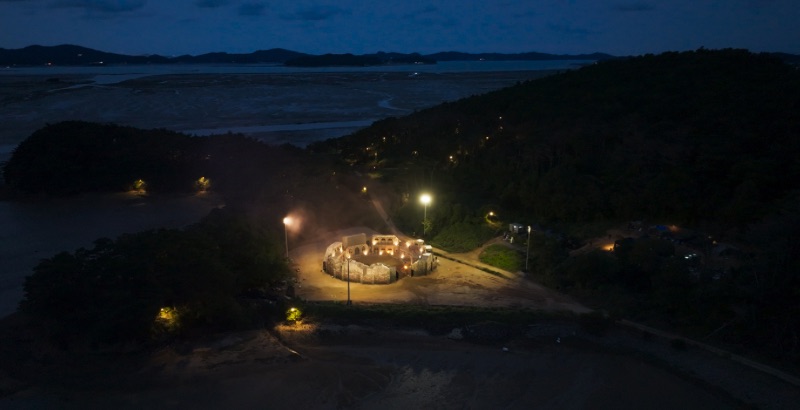
For those in need of a new reality series as we continue to mourn the end of shows such as Physical 100, the new competitive series from Netflix, Siren: Survive the Island, is here to take that place. The Korean survival reality show takes place on a remote island where 24 female contestants, all trained in superior levels of combat and strategy, must compete in six teams of four that have been divided up by their profession.
The six teams — Team Soldier, Team Fire, Team Police, Team Athlete, Team Stunt, and Team Bodyguard — are all competing to shine a light on the female division of their male-dominated professions while also simply displaying their considerable strengths. Siren: Survive the Island, with all ten episodes aired, is a fun, tension-fueled reality series that manages to elevate some of the genre’s lesser attributes. Here are three reasons why the show is worth checking out.
There are no men.

Sorry but not really. Blessed be there is a show where the main narrative for the competing women isn’t just whether or not they can stand in the same arena as the male competitors. Instead, Siren: Survive the Island is solely focused on their strengths as they relate to their job title and the physicality that’s borne from it. In their opening packages and talking head segments, the drama stems from the competing fields, from police officers who believe they’re inherently stronger than the firefighters to the general consensus that the athletes are the ones to be most wary of and the general dismissal of the stunt performers who they believe to be all style and no substance. Sure, the show capitalizes on the cast consisting of only women for the sake of a marketing tool or too (the name, in general, is, admittedly, hokey). Still, no matter the intent, the result is a series with greater stakes and intrigue because the conflict boils strictly down to whose strength is more well-rounded.
The challenges are grueling.

The reality competition series wastes little time in getting straight to the action. The six teams of four are forced to run a strenuous distance over mudflaps to retrieve their team’s flags, only to be told that they have to carry them back to determine the starting ranking. The breathless competitors fare better than most would, but that doesn’t negate the obvious discomfort they’re in, as the challenge combines endurance with strength training and simple balance.
It’s part of what separates it from the pack quickly, too, because rather than having specified challenges based on one element of strength, the show instead utilizes the natural elements around them to create unpredictable and well-rounded tests. No matter their considerable skill and whatever their specific qualifications and training may equip them with, there’s only so much you can prepare for with the unknown, meaning that even those with the greatest endurance and lowest resting heart rate can still succumb to the power of nature.
The competitors don’t seem even to get a moment to rest. While other shows may use one day to shoot one challenge, Siren: Survive the Island is determined to pack in as much drama as it can, stuffing two challenges in a single day over the course of the week. One will be planned challenges — such as the initial race for the flag — while the other, more crucial one, will begin at random, as each team must try and conquer another team’s camp. Whichever team loses the capture-the-flag battle will have to leave the island.
There’s always an inherent curiosity while watching these shows where it’s natural to wonder how well we, the audience, would handle the situations these contestants are faced with. It’s part of what makes them such addictive, timeless watches because even if we’ve never run a mile in our lives, that interest remains. Watching Siren: Survive the Island just makes one feel tired on their behalf.
The pacing staves off any boredom.

Physical 100 had its charm, and despite controversy over the last episode and ultimate winner, there was a reason it amassed such a following. That said, there’s no doubt that the first episode and subsequent challenge could’ve (should’ve) lost their viewers. The pacing was abysmal, and while there’s a necessity to get the audience acquainted with each player so that the upcoming rounds and losses will be more potent, it’s easier said than done when their competitor pool runs 100 people deep. That is a lot of coverage, and the show took its time. That, plus a repetitive first challenge that became less interesting as it wore off, made for an often staid viewing process. Once it got to round two and the contestants had been brought down to 50, things moved at a great, more impactful clip.
Siren: Survive the Island avoids all that by having a much smaller group of competitors, allowing the intros to be about the team rather than detailing the histories of every player and jumping straight into the action. Because, as is the case with most competitive series, we get to know the contestants while watching them in action. The same is true here, as we see which team was all bluster to begin with (the police officers) and which were the underdogs (the stunt team), and who might’ve had the coolest intro packages which weren’t able to initially deliver (my beloved, the bodyguards.)
The pacing makes for a greater, more thrilling engagement, with a cast of charismatic and enormously impressive competitors in their fortitude and skill sets.
The full 10 episodes of Siren: Survive the Island are available now to stream on Netflix.






